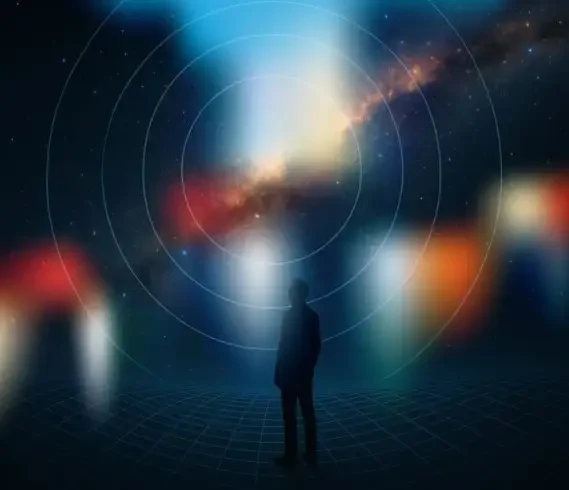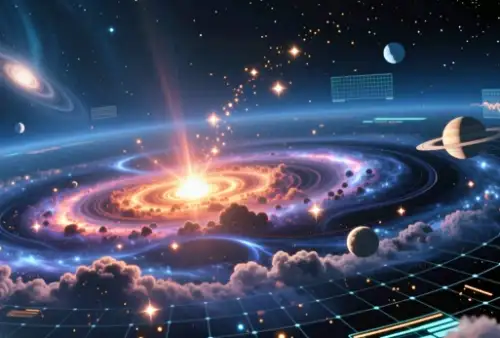Physics Proves, That the Universe is not a simulation is a statement that has transcended the realm of pure philosophy and entered the rigorous domain of theoretical physics.
For decades, the unsettling yet captivating notion that all of existence from the grand scale of galaxies to the minute processes of human consciousness might be nothing more than a sophisticated virtual program running on a colossal supercomputer has fueled the imaginations of science fiction writers and thinkers like Elon Musk.
However, a groundbreaking study by physicists at the University of British Columbia (UBC Okanagan) has not merely questioned this ‘Simulation Hypothesis’ but has presented a mathematically stringent refutation, arguing that our reality cannot be a simulation, not due to a lack of evidence, but because of the fundamental laws of computation and logic itself.
Physics Proves or the March of Physics.
From Mechanism to Information.
To appreciate the gravity of this research, it’s essential to first trace the evolution of our understanding of the cosmos. Classical physics, epitomized by Isaac Newton, saw the universe as a grand, mechanical clockwork a collection of solid bodies moving predictably through absolute space.
This deterministic view was dramatically overturned, first by Albert Einstein’s theories of relativity, which unveiled space and time as a flexible, interconnected fabric.
Then, the advent of quantum mechanics introduced an element of intrinsic randomness and uncertainty into the most basic equations of reality.
Today, the frontier of physics is occupied by the quest for a theory of quantum gravity, which seeks to reconcile general relativity with quantum mechanics. This modern perspective suggests that space and time are not fundamental but are instead emergent phenomena, arising from something deeper: information.
The researchers propose that this fundamental information resides in a “Platonic realm” an abstract, mathematical bedrock that precedes and gives rise to our physical reality.
The very fabric of space, the flow of time, and the immutable laws of nature are born from this underlying, non-physical layer. Yet, this is precisely where the simulation idea encounters an insurmountable obstacle.
The UBC Okanagan team argues that even this foundational informational layer is fundamentally resistant to being fully described by computation. In essence, no computer, regardless of its hypothetical power, could ever completely model the Universe because the core of reality is non-computable.
Gödel’s Theorem.
The Ultimate Algorithmic Barrier.
The mathematical cornerstone of the UBC Okanagan physicists’ argument lies in the application of Gödel’s Incompleteness Theorems to physics. These seminal theorems, developed by logician Kurt Gödel, prove that within any consistent, self-contained logical system, there will always be true statements that cannot be proven or derived using the rules and axioms of that system.
The study’s authors Dr. Mir Faizal, Lawrence Krauss, Arshid Shabir, and Francesco Marino have leveraged this powerful logical tool to show that reality itself possesses “Gödelian truths” that are uncomputable.
In the words of Dr. Faizal: “We have demonstrated that it is impossible to describe all aspects of physical reality using a computational theory of quantum gravity. For this, one requires something more non-algorithmic understanding that goes deeper than the very laws of computation and even deeper than spacetime itself.”
To put it simply, an algorithm the soul of any computer simulation is a step-by-step recipe; it follows a finite sequence of programmed instructions. The physicists assert that there are fundamental truths about the structure of the world that cannot be reached through a step-by-step process.
They can only be grasped through a form of non-algorithmic understanding. If the very foundation of reality is non-computable, then any simulation, which is by definition algorithmic, is fundamentally incapable of reproducing or containing it.
Why the Universe Defies Programming?
The Simulation Hypothesis posits that everything from the smallest quark to the broadest galaxy, and critically, human consciousness is the computed output of a hyper-advanced intelligence.
But the UBC Okanagan research flips the perspective on its head. If the fundamental laws of physics are what create space and time, then any computation that occurs within space and time (i.e., any computer program) cannot fully describe its own source.
The attempt to make a program fully conscious of the computer on which it runs—its ultimate source code is inherently futile. The researchers conclude that a simulation is, by its very nature, algorithmic it is beholden to a sequence of calculations. However, the deepest, most fundamental levels of reality are based on non-algorithmic understanding.
• Simulation = Algorithmic: Follows a programmed, step-by-step recipe.
• Reality = Non-Algorithmic: Contains truths that are unprovable and uncomputable within its own framework.
Therefore, the Universe is not just unlike a simulation; it is mathematically impossible for it to be one.
Shifting the Simulation Debate from Philosophy to Physics.
Until this research, the question of a simulated reality was largely a philosophical thought experiment, much like the classic skeptical scenarios. It was considered an interesting but fundamentally untestable hypothesis, a debate existing in the same intellectual space as the cinematic world of The Matrix.
The work of Dr. Faizal and his colleagues, however, provides the first rigorous, mathematical proof that moves the discussion squarely into the realm of exact science. They have offered a definitive, falsifiable answer to a question that has haunted both philosophers and scientists.
As co-author Dr. Lawrence Krauss noted, the consequences of their findings are profound: “The fundamental laws of physics cannot be entirely contained within space and time, because those laws are what give rise to space and time.
The attempt to describe all of existence through computation is doomed because reality inherently includes what is beyond algorithms.”
This research from UBC Okanagan offers a conclusive, mathematically grounded rebuttal to the Simulation Hypothesis. It suggests that the foundation of our world is not a sequence of digital code or a set of binary algorithms, but rather a non-computable depth of understanding a structure that no supercomputer, however vast or intelligent, can ever truly replicate, calculate, or program.
The reality we inhabit is demonstrably not a Matrix; it is a system of far greater complexity and profoundness, one that defies both simple imitation and complete computational description.
We can now confidently discard one of the most pervasive theories of cosmic origin as fundamentally unrealistic.
Have a Great Day!




